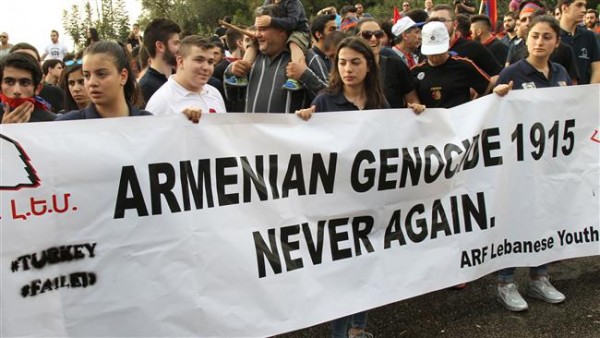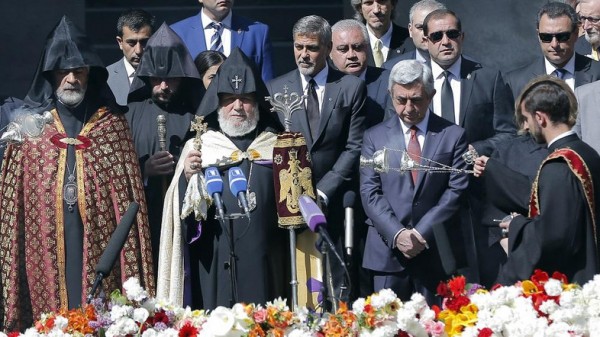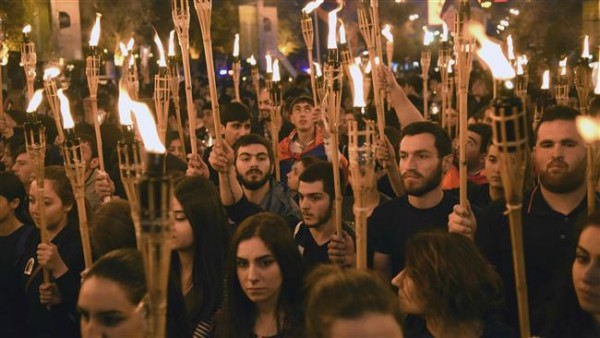
Lebanon’s Armenians marked on Sunday the 101 anniversary of when some 250 Armenian intellectuals were rounded up by Ottoman Turks as the first step of the genocide against them.
A demonstration that started at the Antelias Square ended at the town’s main highway and marked the genocide that was committed against the Armenians.
About 20 countries have recognized it as genocide , but Turkey rejects the claims, arguing that 300,000 to 500,000 Armenians and as many Turks died in civil strife when Armenians rose up against their Ottoman rulers and sided with invading Russian troops.
In Yerevan Armenia’s capital Lebanon’s son-in-law Hollywood star and rights advocate George Clooney led thousands of Armenians on a march to a hilltop memorial to commemorate the 101st anniversary of the World War I-era Armenian genocide.

A staunch advocate of the massacre’s recognition as genocide, Clooney arrived in the ex-Soviet nation on Saturday to take part in the hugely symbolic ceremonies.
Clooney and the French singer of Armenian origin Charles Aznavour joined President Serzh Sarkisian and thousands of Armenians to lay flowers at the eternal flame at the imposing Tsitsernakaberd memorial as requiem services for the victims were held in churches across the country.
Second Global Forum Against the Crime of Genocide attended by George Clooney and Armenian President. #Armenia pic.twitter.com/yGSjHRNhkQ
— Armenian Genocide (@Genocideof1915) April 23, 2016
Clooney co-chairs the selection committee of the Aurora Prize for Awakening Humanity which was established on behalf of the survivors.
The genocide “is a part of Armenia’s history, it’s also a part of the world’s history, it’s not the pain of one nation only,” the US actor and director said upon his arrival in Yerevan.
The Hollywood heavyweight will name an inaugural recipient of the Aurora Prize during an award ceremony in the city later Sunday.
The laureate will be given a $100,000 grant and will nominate organisations to receive a $1 million award.
“Today, we commemorate the sacred memory of the victims of the Armenian genocide,” Sarkisian said in a statement.
Turkey’s “policy of denial… has not changed, as has not changed its hostile stance toward everything that is Armenian,” he added.
– Tensions with Ankara –

“Turkish leaders are constantly making anti-Armenian statements and are helping our enemy Azerbaijan.”
Late Saturday more than 14,000 people held a torch-lit march through central Yerevan, where a group of activists from nationalist Dashnaktsutyun party burnt Turkish and Azerbaijani flags.
Over a century after the mass killings, tensions still run high between Yerevan and Ankara which supports Armenia’s foe Azerbaijan in the Caucasus neighbours’ conflict over the control of the disputed Nagorny Karabakh region.
Earlier this month, fierce clashes between Azerbaijani and Armenian forces in Karabakh claimed the lives of more than 100 people from all sides.
The worst clashes in decades in the separatist region erupted on April 2 and ended days later with a Russian-mediated ceasefire.
The outbreak of violence sparked fears of a wider conflict that could drag in regional powers Russia and Turkey.
Ankara openly supported its traditional ally Baku.
In a war in the 1990s that claimed some 30,000 lives, separatists backed by Yerevan seized control of the mountainous region inside Azerbaijan that is home to the ethnic Armenian majority.
Azerbaijan and Armenia have not signed a peace deal despite a 1994 ceasefire and sporadic violence on the line of contact regularly claims the lives of soldiers on both sides.
The fragile ceasefire is largely observed but on Sunday Azerbaijan claimed it had destroyed an Armenian tank and its crew and accused Yerevan of shelling Azerbaijani villages using heavy artillery.
Around the world
Similar protests were held in various locations around the world.

Leave a Reply
You must be logged in to post a comment.